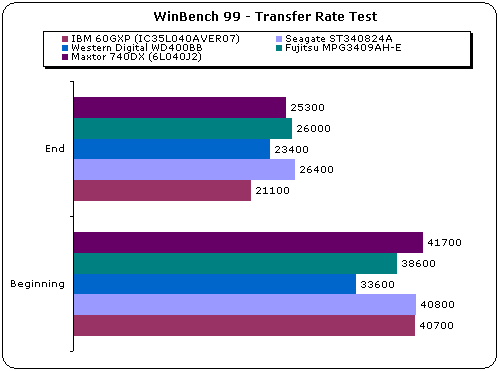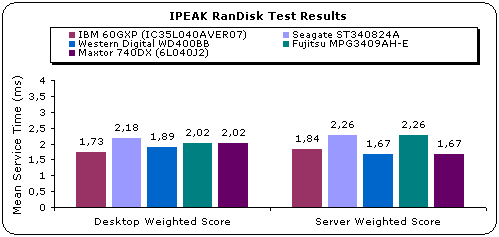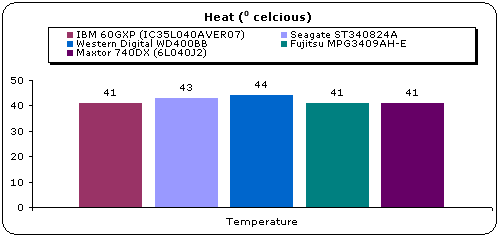1. Introduction
40GB
Roundup Vol 1 - Page 1
Time to upgrade
your HD!
- Introduction
The need for increased storage capacity is becoming evident day by day. As
broadband Internet is now a reality, more and more people are able to download
large amounts of data. The size of Windows 2000 and Windows XP operating systems
also require larger hard disk drives. Games and applications are increasingly
consuming more and more space as well.
Most users wishing to upgrade are looking for the best size, price and performance
when they spend their hard-earned cash. With ever increasing hard disk capacity,
the 40GB hard disk drive has almost become the entry-level standard for disk
drives. In this test we will be putting five 40 GB hard disks through their
paces.
- Features
In this roundup we have tested the following 5 models
- WD
Caviar WD400BB
- Fujitsu MPG3409AH-E
- IBM Deskstar 60GXP (IC35L040AVER07)
- Seagate Barracuda ST340824A
- Maxtor
740DX (6L40J2)
All drives include 40GB formatted capacity, 7200 rpm rotation speed, ATA100
connection interface, 2MB of cache, the same number of heads and slightly different
dimensions/weight. All of these drives are priced between $85-135.
The Maxtor 740DX is the newest drive in this roundup and supports not only
ATA100 but also ATA133, which promises even higher performance. However for
our test, we used the Maxtor 740DX drive running on an ATA100 connection interface
since only few current motherboards support the ATA133 interface.
The Seagate Barracuda ATAIII series arrived in a plastic case, which Seagate
names as "SeaShell". SeaShell is a unique, integrated PCB cover that
enhances handling protection, reduces returns and lowers service costs. Seagate
says that with the "SeaShell" protects and reduced returns of broken
drives at 30%! Anyway it is a good storage case for transportation.


2. Seek Time Tests
40GB
Roundup Vol 1 - Page 2
Seek Times Test

IPEAK's service time tests uses 25.000 random, single sector read/writes at
all the disk's capacity. The resultant distribution of service times is plotted
as a probability density vs. service time. This curve represents the probability
that a request will be completed in a given amount of time. The service time
distribution is not cumulative. The test results can be directly compared to
the access time test.
As the test results show, the Maxtor 740DX has the fastest access time at least
for the IDE drives, while reading. The IBM 60GXP comes second, the FujiTsu drive
comes third with 13.3ms, the WD drive forth with 13.73ms and the Seagate Barracuda
III last with 15.05ms. At the Write Service time, only the FujiTsu and Maxtor
drives didn't gave any outliers at the end of the test.
The IBM had 1166, the Seagate 2617 and the Western Digital 64. The Intel's
IPEAK on-line help explains what outliers mean "...A well behaved storage
subsystems should have any outliers in the service time distribution and the
distribution should be narrow. Outliers in the distribution makes the storage
subsystem unsuitable for real-time applications, such as multi-media, where
variations in service time are detrimental..."
3. WinBench 99 Tests
40GB
Roundup Vol 1 - Page 3
WinBench 99 Test Results
Under WinBench 99 v0.2, each drive has a different behaviour.

At the Business WinMark99 test, the Maxtor 740DX drive gets the first place
with big difference. The drive scores 9500, while the second best score come
from Western Digital with the WD400BB model. The Fujitsu comes third and IBM
60GXP - Seagate Barracuda ATAIII drives last. Slight different behaviour showed
at the "High-End: mark. The Western Digital drive gets the first place,
Maxtor the second, the IBM third and the FujiTsu/Seagate Barracuda ATAIII the
last 2 places.
Transfer Rate Tests
The faster drives under WinBench 99 v0.2 test are the Seagate Barracuda ATAIII
and Maxtor 740DX drives. The Maxtor drive reads at the 41700Kb/s, which is the
highest value, but ends lower than the Seagate (25300), which has the second
best performance. The IBM 60GXP also start high enough but ends quite lower,
at 21100Kb/s. The Fujitsu drive comes third starting at 38600Kb/s, ending at
26000Kb/s and the Western Digital WD400BB comes last:

You can view the density graphs for each drive (Maxtor,
FujiTsu,
IBM,
WD,
Seagate)
4. SCSI Mechanic Tests
40GB
Roundup Vol 1 - Page 4
SCSI Mechanic Linear Reading/Writing Tests
We performed the SCSI Mechanic tests as described in our test methology guide.
The test results are illustrated in the following graph. Note that all numbers
are Kb/s:

The faster drive for the linear "Sequential" reading test comes from
Maxtor with the 740DX series. The drive takes the first place with 34683 Kb/s.
Despite the drive's lowest access time at the "Random" reading test,
comes forth! The Maxtor drive also didn't performed very well at the "Same
Sector" test, which shows how good the drive handles its internal cache
memory. Perhaps with the ATA133 interface numbers can be increased.
The Seagate's Barracuda ATAIII came second in "Sequential", "Random"
and first at the "Butterfly" tests. The IBM 60GXP comes first in the
"Same Sector" and "Random" tests. This shows the drive's
good interface with IDE Bus... At the "Sequential" test comes third
and at the "Butterfly" last with only 10875Kb/s.
The Western Digital comes third in the "Sequential", "Butterfly"
tests. The drive's high access time, gives the last place at the Random test.
Last the FujiTsu drive gets the last place in the Sequential test with only
(?) 29765Kb/s. The drive seems not have the best cache algorithms since the
"Same Sector" result is only 70656Kb/s!

At the linear writing tests, things change dramatically. The Fujitsu MPG3409AH-E
gets the first place in all writing tests. The drive did performed very good
and has a 36095Kb/s score in the Sequential Writing tests. Again outperforms
competition at the Butterfly/Random tests with 23403/17020 respectively.
The Maxtor drive gets the second place with 35650Kb/s at the Sequential tests
and Seagate Barracuda ATA III follows with 35000 Kb/s. At the Butterfly tests,
the Maxtor 740DX comes second and the IBM 60GXP third. The Seagate Barracuda
ATA III has very low performance at both Butterfly/Random writing tests.
The IBM drive seems more balanced with 32.000Kb/s at the Sequential test. At
both Butterfly/Random tests, the drive gets the third/second place respectively,
with however big performance gap from the first Fujitsu drive. The Western Digital
drive gets the forth place at all tests. The performance gap with the first
FujiTsu MPG3409AH-E is high enough - almost 4.7Mb/s at the Sequential tests.
5. IPEAK/Heat Tests
40GB
Roundup Vol 1 - Page 5
IPEAK/Heat Tests
- Combined Read/Writing Tests
Intel's IPEAK test results combine both reading/writing actions and give a
weighted score based upon each drive performance in each specific task. The
height of each bar is the measured mean service time per disk access for a drive
stimulated with I/Os from the given workload. Shorter bars represent better
performance. As we will see a drive that scores well in the "Desktop"
test doesn't mean that will perform the same as the "Server" mode,
since the I/O operations are different.

At the above picture, the weighted (Average) score of all tested drive is shown
up. The drive with the best behaviour under for the Intel's IPEAK "Desktop"
test comes from IBM. The drives weighted score is 1.73. The Western Digital
comes second at the "Desktop" but first at the "Server"
test. The Maxtor 740DX comes also first at the "Server" test, with
1.67ms, and gets one of the last places at the "Desktop" with 2.02ms.
The FujiTsu comes forth at the Desktop and last at the Server test. The Seagate
Barracuda ATA III has the worst values in both Server/Desktop tests.
IPEAK test results are downloadble for all drives (Maxtor,
Fujitsu,
IBM,
WD,
Seagate)
- Heat Tests
The following graph shows each drive temperature under the same workloads
and running time:

As we can see, the Western Digital WD400BB drive had the highest temperature
among the four tested drives. Of course the difference with the rest drives
is not that high but the IBM/Maxtor and Fujitsu drives seem to have slight better
behaviour.
6. Conclusion
40GB
Roundup Vol 1 - Page 6
Conclusion
The 40GB disk category was very interesting since most of our tests showed
a very good performance. The real question here is who is the definantly winner.
We cannot answer directly to that question but both the IBM 60GXP and Maxtor's
740DX seems the most balanced drives in this roundup. Both drives have the lowest
access time, the lowest working temperature, the lowest working time at the
IPEAK test results and a very good behaviour in the linear recording/writing
tests. The IBM 60GXP drive did produced outliers at the end of the test (1166),
while Maxtor's 740DX didn't. Also note that Maxtor's 740DX is the only model
at this roundup that supports the new ATA133 interface!
The Western Digital WD400BB had the higher working temperature, very good IPEAK
test results, good access time (12.73ms) and fair reading/writing performance
at the linear tests. The drive did produced outliers (64) at the end of the
test.
The FujiTsu MPG3409AH-E is an interesting proposal with very high writing linear
performance but not very good IPEAK test results. The access time is the third
best (13.3ms) and didn't produce any outlier at the IPEAK writing service time
test.
Last the Seagate Barracuda ATAIII shows its age and despite the fact that came
first at the linear reading tests, has the worst access time, second higher
working temperature and the worst IPEAK test results. Especially at the IPEAK
writing service time test, it produced 2617 outlier which may trouble user if
plans to use it for A/V use.